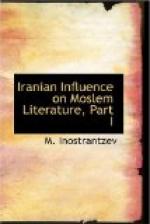[Footnote 1: Ahl-bayat, or people of the house, is the Arabic equivalent of the Iranian Visputhra and was applied by Arabs to the superior Persian noblemen.]
[Footnote 2: Here is evidence, on the one hand, that the Arab historians had Iranian histories at their disposal and on the other, that the latter are still reflected in the yasht literature.]
[The historian narrates how Isfandiyar went into the heart of the kingdom of the Turk and reached his capital which was called “Dez Ruin” and he proceeds to say “and being interpreted in Arabic it means the palace of copper.” There is further reference to the canals and castles which we can trace to the BUNDEHESH. The struggle between Rustum and Isfandiyar is also described. This is followed by a curious passage regarding Zoroaster.]
DINAWARI.
PAGE 26, CAIRO EDITION.
THE CALL OF ZARADUSHT.
[Sidenote: Rustam and Isfandiyar.]
And it is said that Zaradusht the head of the Magians came to Bishtasb the king and told him, “I am the Apostle of God to you”, and gave him the Book which the Magians possess. Then Bishtasb believed in him and accepted his religion which is that of the Magians and exhorted the people of his kingdom to the same and they also accepted it nolence volence. And Rustam the Strong, was at that time the Governor of Sagistan and Khorasan, and he was powerful of body and possessed of great vigour. And when this happened it was reported to Kaykobad the king, this, about the admittance of Bishtasb into the Magian religion and his abandoning the religion of their forefathers. Kaykobad became exceedingly angry at this, and said that this was forsaking of the religion of their forefathers who had inherited it from one generation to another. Then the people of Sagistan were gathered together and they wore incited to destroy Bishtasb. And they revolted against him. Upon this Bishtasb called upon Isfandiyar who was the strongest man of his time and said to him, “Oh son, the kingdom will be entrusted to you. But the affairs will not improve except by killing Rustam, and you know his strength and vigour. But you are his match in power and prowess. So do you choose from the army whomever you like and then proceed against him.” So Isfandiyar selected 12,000 Persian knights from the forces of his father, and marched against Rustam. And Rustam proceeded towards him between the boundaries or Sagistan and Khorasan. Isfandiyar suggested to Rustam that their armies should be excused from attacking each other, but that they two should engage in single combat and that whoever killed the other should be held to be the victor. Rustam agreed to the proposal and the covenant. Then the two armies stood abide and the two warriors engaged in a duel. Now the Persians have a good deal to say in this matter and that it was Rustam who killed Isfandiyar and that the latter’s army returned to Bishtasb and informed him of what had happened to his son Isfandiyar. The king was overwhelmed with grief fell ill and died. And the kingdom, came to the grandson Bahman, son of Isfandiyar, and it is related that soon after Rustam returned to his residence in Sagistan, he died.[1]




